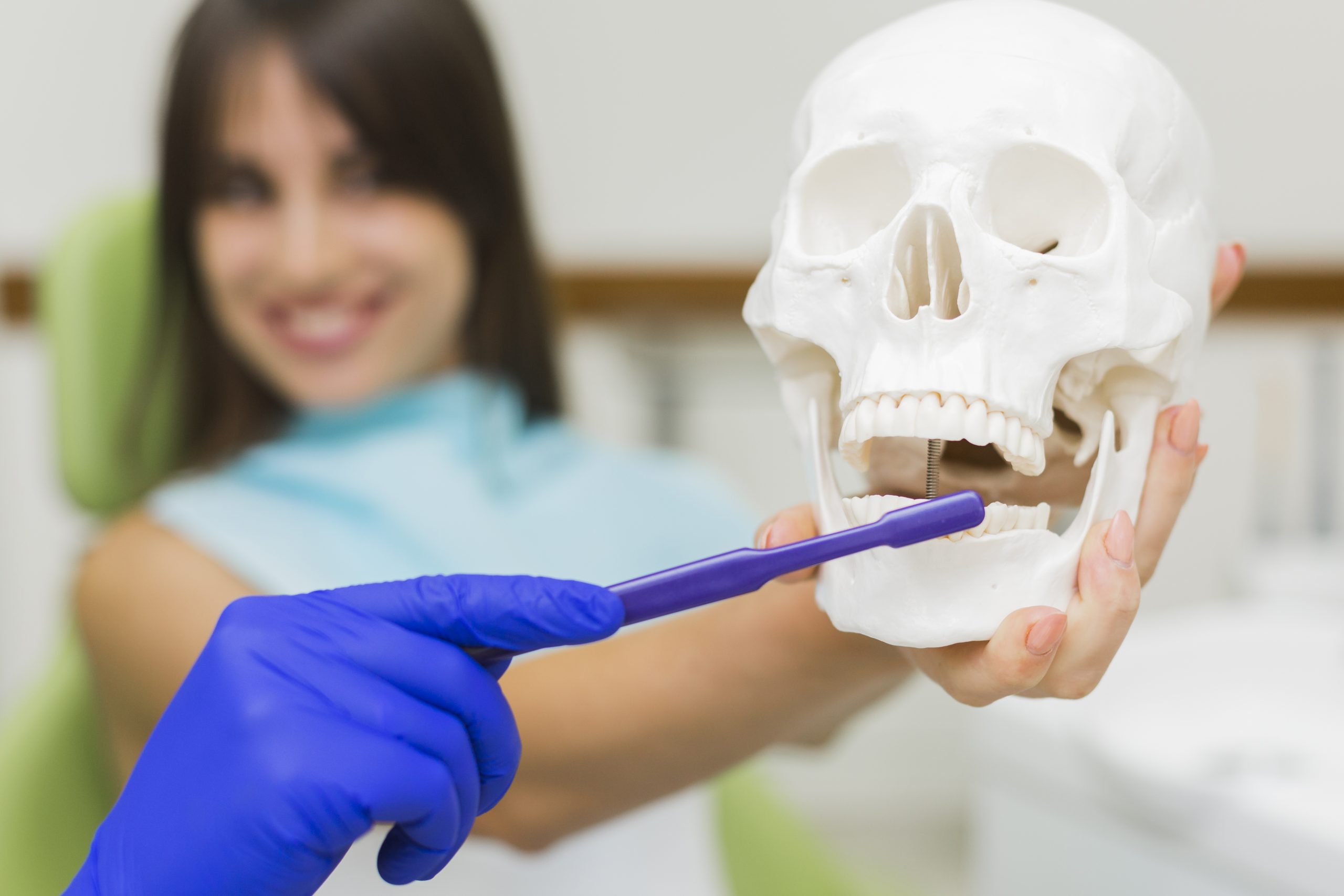Dentures are a common way to replace missing teeth, especially when several or all teeth have been lost over time. Dentures are intended to support basic oral function, assist with chewing, and allow for more comfortable eating in some cases.
However, dentures are not always the most appropriate option for everyone. In some situations, they may not fit securely or function properly, depending on the individual’s oral cavity, remaining teeth, or overall health.
Understanding who cannot wear dentures can help patients explore alternative approaches to tooth replacement that may offer better comfort and stability. Your dental team can assess whether dentures are appropriate or suggest other treatments, such as dental implants or implant-retained dentures.
Contents Navigation
Summary of The Content
- Dentures are custom-made appliances that replace missing teeth and support daily functions like eating, speaking, and maintaining facial structure.
- They can be either full dentures, which replace all teeth in a jaw, or partial dentures, which replace several teeth and attach to adjacent teeth.
- A healthy oral cavity, stable bone, and proper fit are important for comfort and long-term function.
- Not everyone is suited to traditional dentures, and factors such as severe bone loss, ongoing gum disease, a strong gag reflex, or certain medical conditions may affect suitability.
- Ideal candidates often have healthy gums, sufficient bone density, and the ability to manage daily care and follow-up visits.
- Poorly fitted or unsuitable dentures may cause mouth sores, affect nutrition, alter speech, or reduce comfort in social settings.
- Alternatives like dental implants, implant-supported dentures, and dental bridges may be considered based on individual oral health and needs.
How Dentures Work
Dentures are custom-made appliances that help replace missing teeth and support basic actions like chewing, speaking, and facial appearance. They rest on the gums and surrounding oral tissues, using shape, fit, and suction to stay in place throughout the day. There are two main types of dentures: full dentures and partial dentures. The type recommended depends on how many teeth are missing.
Full dentures are used when all teeth in the upper or lower jaw are lost. They rest directly on the gums—a secure fit and healthy oral cavity support better comfort and basic function. Partial dentures are used when some natural teeth remain. They connect to nearby adjacent teeth using clasps or small attachments. This design can help improve chewing and prevent nearby teeth from shifting out of place.
For either type to work well, patients need healthy oral tissues, stable bone, and properly aligned upper and lower jaw positions. When these factors are present, dentures are more likely to feel stable and function properly during everyday activities. If a denture fits poorly, it may feel loose, cause discomfort, or lead to irritation—especially in cases of bone loss or gum disease.
Design, materials, and proper adjustments all contribute to how well dentures perform while eating different foods or speaking. This may support easier mealtimes and daily comfort when wearing artificial teeth. Maintaining good oral health remains important for denture wearers. Conditions like dry mouth, swelling, or sore spots can affect comfort and fit.
Common Situations Where Dentures May Not Be Suitable
Traditional dentures may not suit everyone. Factors such as severe jawbone loss, chronic gum disease, oral sensitivity, or certain medical conditions can affect their comfort and stability. Understanding who cannot wear dentures helps highlight when other tooth replacement options might be considered.
Severe Jawbone Loss or Poor Bone Quality
The jawbone provides a stable foundation for dentures. When significant bone loss or poor bone quality occurs, conventional dentures may feel loose and lack proper support. In some cases, procedures like bone grafting may be considered before starting treatment with dentures.
Chronic Oral Conditions or Active Gum Disease
Healthy gums and stable oral tissues help dentures fit comfortably. Conditions like persistent gum disease, oral thrush, or frequent inflammation can reduce comfort and affect long-term oral health. Addressing these concerns first is often important before moving forward with dentures.
Oral Sensitivity or Strong Gag Reflex
Some patients have heightened sensitivity in the oral cavity or a strong gag reflex. This can make wearing full dentures, especially upper ones, difficult over time. Adjustments or alternative tooth replacement approaches may be discussed when tolerance is low.
Medical or Cognitive Conditions That Affect Daily Management
Wearing dentures requires daily care, cleaning, and removal for comfort. Conditions such as dementia, stroke, or severe arthritis may interfere with inserting or maintaining dentures effectively. These challenges can influence whether dentures are considered a suitable treatment plan.
Are You a Good Candidate for Dentures?
Some people adapt to dentures more comfortably than others. Suitability depends on several oral and general health factors. While these points provide general guidance, only a professional assessment can determine whether dentures are appropriate for an individual’s needs. Here are qualities that may support better comfort and function with dentures:
- Healthy gums and oral tissues:
Stable gums and healthy oral tissues provide a comfortable surface for dentures to rest on during daily wear. - Sufficient bone support:
Adequate jawbone height and density help dentures feel more stable, especially when eating or speaking. - Healthy oral environment:
Managing concerns like active gum disease, tooth decay, or frequent inflammation may help create a healthier foundation for wearing dentures more comfortably. - Commitment to oral hygiene:
Regular cleaning of both dentures and the oral cavity reduces irritation and helps maintain long-term oral health. - Willingness to attend follow-up visits:
Adjustments are sometimes required to improve fit and comfort. Ongoing oral health care supports denture performance. - Ability to manage daily maintenance:
Patients who can insert, remove, and clean their dentures consistently are more likely to experience better daily comfort.
Risks of Using Unsuitable or Poorly Fitted Dentures
When dentures do not fit properly or are used in unsuitable situations, they may create discomfort or other challenges. These risks highlight why professional assessment and ongoing care are important for long-term oral health. Common risks include the following:
- Mouth sores and irritation:
Poorly fitting dentures can rub against the gums and oral tissues, causing sore spots or recurring irritation. - Difficulty with eating and nutrition:
Loose or unstable dentures may make chewing harder, reducing food variety and affecting overall nutrition. - Speech changes:
Ill-fitting dentures can impact how some sounds are formed, causing temporary or ongoing speech difficulties. - Bone and tissue changes:
Continuous pressure from unstable dentures may contribute to gradual bone loss or changes in the oral cavity. - Reduced confidence or comfort:
When dentures feel loose or uncomfortable, patients may avoid social eating or speaking, affecting daily quality of life.
Exploring Alternative Options for Tooth Replacement
When dentures are not suitable, other tooth replacement treatments may be considered. The right choice depends on factors such as oral health, bone condition, and individual treatment goals.
Dental Implants and Implant-Supported Dentures
Dental implants are small titanium posts placed in the jawbone, where they act as supports for artificial teeth. They may replace a single missing tooth or support several artificial teeth if there is enough healthy bone.
Implant-supported dentures use multiple implants to increase stability, which may help with chewing and speaking. Candidacy depends on factors such as sufficient bone density, healthy gums, and a professional dental assessment.
Fixed Dental Bridges
A dental bridge replaces one or more missing teeth by anchoring to healthy adjacent teeth for stability. They are usually considered when enough strong natural teeth remain to act as anchors. Bridges may help improve function and appearance, though suitability depends on oral health and the condition of nearby teeth.
Why a Personalised Dental Assessment Is Crucial
Every patient’s mouth is unique, and tooth replacement options depend on factors such as oral health, bone condition, and overall health. While general information can help explain who cannot wear dentures, only a personalised assessment can confirm suitability.
A professional evaluation involves examining the teeth, gums, and jawbone, as well as reviewing overall medical history. This process helps identify which treatments may be most comfortable, functional, and appropriate for long-term care.
A qualified dentist can tailor any recommended treatment plan to individual needs by discussing goals, lifestyle, and expectations. This approach avoids one-size-fits-all decisions and encourages long-term oral health in a way that suits each patient.
Final Thoughts
Dentures can be helpful for many people, but they are not the right choice for everyone. Exploring options, from traditional dentures to alternatives like dental implants or bridges, helps identify a treatment suited to your needs.
If you are considering tooth replacement, a personalised assessment can help guide your next steps. This approach allows for careful consideration of your unique needs, preferences, and oral health before making any decisions.
You’re welcome to talk with our team at Karrinyup Dental Centre to discuss treatment options in a supportive setting.





